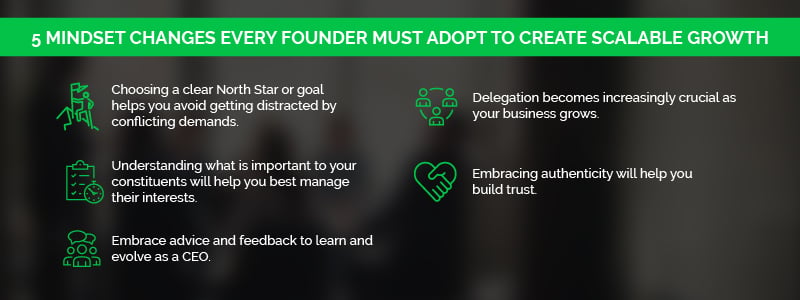5 Mindset Changes Every Founder Must Adopt to Create Scalable Growth

There are five mindset changes every business founder must make as they journey from the idea stage through the IPO and beyond. Here’s what you need to know about them.

Founders who evolve with the needs of their business tend to stay CEOs for a long time. Surprisingly, these individuals are rather few. Studies show that after being in business for three years, only 50% of founders remain as CEOs. That number drops to 40% after the fourth year, and continues its downward spiral to 25% by the time the initial public offering (IPO) comes along.
So, how do founders avoid being on the wrong side of these statistics? There are five mental models you can adopt to ease the process. Here’s what you need to know about them.
Choose a clear North Star
A North Star is used in marketing and other related circles when selecting key performance indicators (KPIs) to measure progress. This metric enables you to avoid distractions and keep your eyes on a stated goal, especially when outside pressures try to get you to change course.
As a leader, you need to decide early on what you consider most important. Your customers, employees, investors, and other stakeholders will also try to define what is crucial for your company, but you can’t please everybody. You must prioritize by identifying the highest leverage constituency and choose your goal based on what creates the most value for them.
Selecting this element early is crucial to a company’s fate, too. Amazon’s founder, Jeff Bezos, chose early to ignore shareholders’ opinions and focus on delighting customers, for example.
Understand what is important to your constituents
After identifying your North Star, you must next understand your constituencies’ – partners, employees, investors, advertisers, and other parties – interests and how to balance them. It helps to boil these down to appropriate metrics, processes, and product experiences. Fortunately, this is very similar to your early stages as a founder when you worked to find a product-market and attract, engage, and retain your first customers.
You’ll quickly realize that your job as CEO will entail making trade-offs between various parties’ interests and that this is often tough. Accepting this as necessary is a huge part of a CEO’s growth curve, however.
Receive advice and feedback
The only way to evolve as your business scales is to keep learning. The more advice you can get and mentors you can find, the more you can tilt your company’s momentum toward improvement. There are many sources you can turn to for guidance, including investors, experienced CEOs, books, and business blogs. You could also turn to peers at the same stage of the entrepreneurship journey to learn how they tackle similar problems. This is especially important in fast-paced industries, like tech, where peer-to-peer communities are often the only way to stay abreast of all that is happening.
You will also need feedback that is straightforward and honest to ensure you are properly performing your role as CEO. Find people within your organization whose input you can receive and act upon when necessary. Power dynamics often come into play here, but it helps to remember that feedback is a gift that allows you to improve as a leader.
Learn to delegate
As a founder, you are likely already aware of the limited resources at your disposal. These tight strings are the main reason you found yourself involved in almost every detail and department of the company in the beginning. This will have to change as the company scales, but many founders struggle with it.
Rather than insisting on having a hand in everything, you must learn to use internal communications and recruiting as a means of leveraging your limited time. Deploy exceptional leaders to fill gaps, become comfortable with delegating tasks, and institute development programs to benefit your employees and the business as a whole.
You don’t want to delegate everything, though. Keep doing the tasks that helped your business grow in the first place. Maintain a level of oversight over product development if it’s crucial to your operations, for example, but choose to let go in other departments like marketing. This allows you to do more with your time while still safeguarding the critical aspects of your business.
Embrace authenticity to build trust
Your company likely started out as a small, close-knit unit where everybody knew each other – including you. It will eventually become a larger operation where most employees don’t know you, and building trust will become even more crucial.
Trust is created over time and takes a lot of work, but being yourself is a good start. Avoid trying to live up to a mental image of how a CEO is “supposed” to act and look. Instead, ensure you are being transparent and delivering on your promises, even as responsibilities are heaped on your plate.
How working with a trusted partner can help
The process of starting a business can be overwhelming. There is so much to do and track, and you’ll likely see a lot of wins and losses before you feel like you’ve got your feet under you. That overwhelmed feeling may return when your business begins to scale, though. That’s because you’ll need to get the right salespeople in place at the right time with the right message to keep customers coming in.
At MetaGrowth Ventures, we help founders by providing the sales tools and training they need to achieve scalable growth supported by a successful, world-class sales team. If you’ve identified where you want your business to be and need just that extra push to get you there, contact us today. Our experts can’t wait to show you more about how we can help you scale your sales operations.
Written by
Joe Arioto
